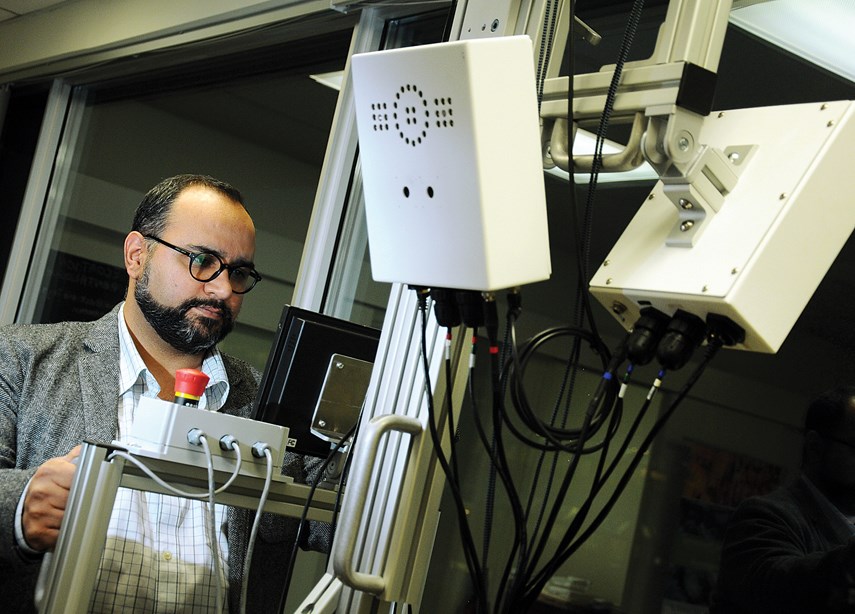Plants may not be able to talk but they never lie about their health.
And that’s why a North Vancouver-based company is on a mission to help plants and crops communicate about their overall well-being to the farmers and growers that tend to them.
Ecoation Innovative Solutions Inc. touts an artificial intelligence platform that examines and predicts plant or crop stress so that growers can reduce crop loss, use less pesticides and generally manage potential plant-related problems before they become an issue.
“Ecoation essentially pinpoints problems in your crops at the earliest stage before you can even see the symptoms with your eyes,” Ecoation founder and CEO Saber Miresmailli told the North Shore News.
“Plants are living things, and they change their chemistry internally when they are fighting stress and our technology can non-invasively detect those chemical changes and physiological changes inside the plant.”
Miresmailli, who founded Ecoation in 2010, defined plant stress as anything that could hinder the general activity and productivity of crops or plants.
Typically, he said, factors that could contribute to plant stress could include anything from pests or diseases, poor environmental conditions, or a lack of proper nutrients or water.
In late September, Ecoation was awarded the $110,000 first prize in the 2017 BCIC-New Ventures Competition, an annual awards competition that honours innovation in up-and-coming companies throughout the province.
For Miresmailli, the New Ventures Competition win is part of a larger narrative where the work his company has been pursuing during the last few years is becoming more widely known to the public.
“We’d been completely under the radar for the first three years, then we basically perfected our method and our intellectual properties, and then we started talking about the concept publicly about two and a half years ago,” he said.
That method includes three technological components, Miresmailli explained, including sensors that actively and non-invasively probe plants and measure their responses, an artificial intelligence platform that captures the data and makes sense of it, and an automated apparatus that does the measuring.
“The other component is the mobility platform, whether it’s a robotic roller that goes in greenhouses, whether it’s a robotic arm that goes in nurseries, or it’s a drone that can fly over your crops,” he said.
The system is wireless, and after Ecoation’s sensors have detected a degree of crop or plant stress the data is then delivered to a grower or farmer’s cellphone or computer.
It’s then up to the grower as the farming and agriculture expert to decide what to do next.
Miresmailli moved to Canada from Iran in 2003 to pursue his master’s degree followed by a PhD in plant sciences at UBC.
His passion for food systems and technology is evident in his devotion to giving those who grow the food that everybody consumes all the tools at their disposal.
His main point: by the time a grower or farmer notices the effects of crop stress on their plants – discolouration, decay, withering, poor yield – it’s likely too late to
do anything.
“This is very important because there is a time frame between the instance of catching an infection or having an infestation with the pest than the time when you can actually see the visual symptoms of that disease or that pest.
Usually in the greenhouse this timeline is about 10 days to two weeks,” he said.
“If you enable the farmers to find the problems at various stages they have many other tools that they can deploy.”
Miresmailli said Ecoation has set up its crop stress detection system on farms in five countries, with plans to expand.
The ultimate goal, he said, would be to help establish a global, digital centre of disease control, but for plant health – a database that could allow growers anywhere to identify a problem and quickly find a solution.
“If you happen to have a particular deadly disease for tomatoes in Iran and you’ve never seen this before, if you basically have the ability to identify and know what kind of problem you’re dealing with and what it’s come from you can immediately choose the right remedy,” he said.
While Ecoation’s systems are billed as a way for farmers to reduce economic loss due to crop damage and overall reduce the cost of production, Miresmailli said his goal more generally is to help all food systems maintain their overall health and robustness.
He told a story about working in the biofuels industry before and after his post-doctoral work several years ago.
Miresmailli knew he could build a career working in sustainable energy development working in biofuel energy, but he had his eureka moment when he realized he wanted to return and share his expertise with his first passion: food, plants and crops.
“If you don’t have enough energy you can walk anywhere you want to go,” he said about his decision to ditch biofuel energy in favour of crops and plants. “But if you don’t have food you can’t walk.”
Learn more about Ecoation Innovative Solutions Inc. at ecoation.com.



